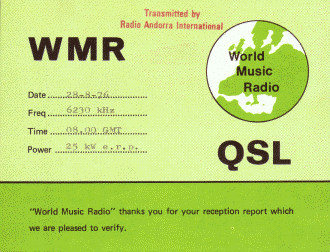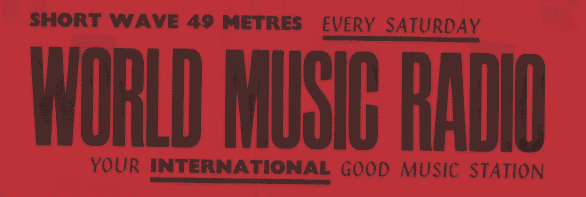

From
August 28 1976, RADIO-ANDORRA is relaying the
WORLD
MUSIC RADIO programmes every saturday on shortwaves.

A SHORT HISTORY OF WORLD MUSIC RADIO
The original World Music Radio was a so called short wave
"pirate"
which had been transmitting its music and DX programmes
on Sundays
for many years from a fixed location in The Netherlands.
On August 19, 1973,
it was traced by the Dutch GPO and closed down. From
that date on,
the WMR team endeavoured to return to the air as an authorised
and legal commercial station. This aim was achieved in
June 1976 when
agreement was reached with Radio Andorra for the transmission
of
WMR's programmes on Saturdays from 08.00 - 14.00 GMT,
starting
as from August 28, 1976.
(source : Word Music Radio, 1976)
Sounds here : http://193.63.162.100/andwmr.htm
http://members.aon.at/wabweb/radio/hoerzb.htm

Offshore Echos France, Nr 35, October 1980:
There was only a little information in OEF on WMR, but many more people
are now aware of their existence and tune in regularly. The station broadcasts
through the facilities of Radio Andorra every Sunday evening from 2100-2200
GMT on 6219 kHz, the 3 kW transmitter being situated 5 miles outside
the town of Andorra. The signal has already been received as far
away as Australia and correct reception reports accompanied by 2
IRC's are verified with their QSL card. The address of World Music
Radio is: WMR, PO Box 4078, Amsterdam, Holland. The station is run in conjunction
with the World Radio TV Handbook, and also at present carries an advertisement
for Radiovisie. Paul Dane can be heard from 2100-2130 with the WMR DX World
edited by Andy Sennitt at 2120, and then Lee Alvin concludes proceedings
from 2130-2200 closedown. When writing to WMR, please mention that you
read about the station in OEF.
Offshore Echos France, Nr 37, March 1981:
In november, we received the following information from WMR: The experimental
return of WMR via Radio Andorra last February, was financed entirely by
the individual members of the WMR team. It was hoped that actually being
on the air would improve the chances of attracting adequate commercial
sponsorship, for, a radio station which is not on the air simply does not
exist. In the summer of this year, Radio Andorra completed the installation
of a new 10 kW transmitter and log-periodic antenna. Reception improved
dramatically. The increased hire charges for the new facilities were, however,
far beyond the resources of the WMR team who had still not been able to
negociate the necessary sponsorship. The broadcast of 19th October 1980
was very nearly the last.